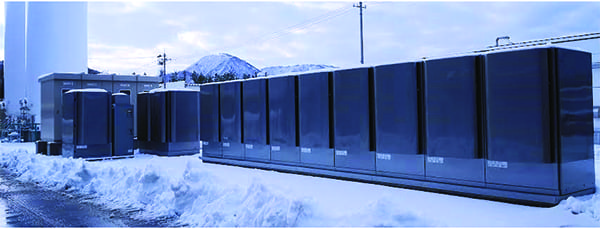Bloom Energy Converts U.S. Fuel Cell Fleet to ‘Certified’ Low-Leak Natural Gas
Credit to Author: Sonal Patel| Date: Thu, 21 Apr 2022 13:02:05 +0000

Bloom Energy’s U.S. fuel cell installations deployed at 700 sites will over the next two years use certified, “responsibly sourced” natural gas from EQT Corp. The development marks a pioneering effort by a power generator to bolster its commercial and industrial customers’ environmental, social, and governance (ESG) efforts.
Bloom Energy, whose primary business stems from its solid-oxide fuel cell (SOFC) platform for distributed energy, on April 21 announced it purchased certificates for all its U.S. fleet’s natural gas consumption from EQT, a Pittsburgh–based natural gas production company. EQT, whose operations are focused in the Marcellus and Utica Shales in the Appalachian Basin, this January certified the majority of its natural gas production—which it says comprises 4.5% of all natural gas produced in the U.S.
EQT’s natural gas is certified by two standards: the EO100 Standard for Responsible Energy Development, which was developed by non-profit Equitable Origin; and MiQ, a standard developed by Rocky Mountain Institute and SYSTEMIQ. Both standards attempt to provide assurance that certified gas meets criteria that are geared toward methane emissions reductions, including from leakages.
While the EO100 Standard is based on five universal principles that consolidate and align international management systems, performance targets, and reporting frameworks, the MiQ standard assesses and “grades” (on a scale from A to F) the methane performance of natural gas production around the world. Responsible Energy Solutions, an independent assessment body for both the EO100 and MiQ standards, assessed EQT’s performance against the EO100 and MiQ standards at roughly 200 well pads located in Greene and Washington Counties, Pennsylvania. These facilities collectively produce approximately 4 billion cubic feet (BCF) per day.
More Natural Gas Producers Seeking Certification
“EQT received both certifications in November, and the first block of the company’s certified natural gas is now available for trading on MiQ’s Digital Registry,” which was launched in December 2021, MiQ said. “One certificate is issued per MMBtu of certified natural gas. Certificates can be traded bundled (combined with natural gas delivery) or unbundled – massively increasing the potential for significant liquidity in the markets,” it explained. “The certifications provide a transparent, verified method for tracking EQT’s ESG commitments, which include achieving net-zero Scope 1 and 2 greenhouse gas (GHG) emissions and reducing EQT’s methane emissions intensity by 65% by 2025,” it added.
MiQ suggests 350 BCF of U.S. produced Independently Certified Gas (ICG) is currently available on its Digital Registry ready for trading. The volume includes production from several natural gas producers. Along with EQT, these include Northeast Natural Energy, Chesapeake Energy Corp., BP’s South Haynesville basin wells. Oil and gas major ExxonMobil is also seeking MiQ certification for natural gas produced at Poker Lake, New Mexico.
“The development marks a step-change in the potential for methane abatement across the oil and gas industry, by creating the transparency needed to enable buyers and producers to differentiate gas based on its methane emissions,” MiQ noted. “The volume of ICG, which has been issued over the last six months, equates to over 100 [liquefied natural gas] cargoes.”
Growing Demand for Certified Natural Gas from Commercial and Industrial Customers
Bloom Energy, which this month closed a certificate trade agreement (CTA) with EQT, notably became one of EQT’s first customers for the certified natural gas. For EQT, the agreement forms a major pillar that could uphold the natural gas industry’s quest to remain relevant as decarbonization gains steam. “Natural gas offers an immediate path to decarbonize industries in an impactful way,” noted Toby Z. Rice, EQT president and CEO. “This agreement validates our belief that certified natural gas is a differentiator for customers seeking affordable, reliable, and clean energy sources that are produced with the highest of ESG standards.”
For Bloom, the certification provides gas value stream transparency for its customers. “The use of certified natural gas is gaining increasing interest from major organizations, such as T-Mobile, who value the benefits of clean, reliable, and resilient energy,” the company noted on Thursday.
“As the energy industry works to make renewable and zero-carbon technologies more widely available, we must do everything in our power to reduce the carbon intensity of today’s energy production,” said Stephen Lamm, senior director of sustainability at Bloom Energy. “By transitioning our domestic fleet of fuel cells to certified natural gas, we believe we are taking an immediate and impactful step to help eliminate methane emissions as we lay the foundation for a net-zero future. Lamm urged other gas producers and consumers to join the effort to embrace “more responsible practices.”
—Sonal Patel is a POWER senior associate editor (@sonalcpatel, @POWERmagazine).
The post Bloom Energy Converts U.S. Fuel Cell Fleet to ‘Certified’ Low-Leak Natural Gas appeared first on POWER Magazine.